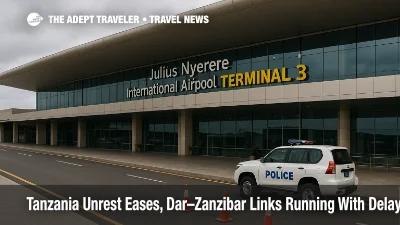Tanzania
If you're planning your next adventure, travel to Tanzania should be at the top of your list. Nestled in East Africa, Tanzania boasts stunning natural beauty, rich cultural heritage, and thrilling wildlife experiences that make it a top tier travel destination. The awe-inspiring Mount Kilimanjaro, the highest peak in Africa, offers unforgettable trekking opportunities for adventure enthusiasts. Imagine soaking in the expansive beauty of the Serengeti National Park, home to the world-renowned Great Migration, where millions of wildebeest and zebra traverse the plains in a spectacular natural event. For those seeking marine adventures, the Zanzibar Archipelago is a dream come true with its pristine beaches, crystal-clear waters, and vibrant marine life. Tanzania's cultural tapestry is equally compelling – experience the warmth and hospitality of the local tribes like the Maasai, who maintain centuries-old traditions and ways of life. Towns such as Arusha and Moshi present an eclectic mix of markets, art galleries, and dining options that reveal the modern vibrancy of Tanzania. Additionally, the lesser-known but equally stunning Ngorongoro Crater is a UNESCO World Heritage site teeming with diverse wildlife, offering a unique safari experience. When you travel to Tanzania, you immerse yourself in a land of contrasts and vibrant experiences, ensuring a journey that will etch itself into your heart and memory forever. Whether you're looking to relax on idyllic beaches, explore lush landscapes, or dive into rich cultural experiences, Tanzania has it all – making it an impeccable choice for travelers of all kinds.
The History of Tanzania
When planning a journey, few destinations promise such a rich tapestry of history and culture as Tanzania. Located on the eastern coast of Africa, Tanzania beckons travelers with its incredible blend of natural beauty and historical significance. The allure of Travel to Tanzania lies in its unique past, shaped by diverse cultures and civilizations. From ancient fossils to trade routes that shaped global commerce, Tanzania offers a captivating glimpse into humanity's shared heritage.
The Cradle of Mankind
One of the most compelling reasons to Travel to Tanzania is its status as the "Cradle of Mankind." The Olduvai Gorge, located in the Great Rift Valley, is one of the world's most significant paleoanthropological sites. Here, ancient fossils unearthed by pioneering archaeologists Louis and Mary Leakey have provided remarkable insights into human evolution. A visit to this awe-inspiring location allows travelers to stand where our earliest ancestors once roamed, making it a pilgrimage for anyone fascinated by our origins. The nearby Laetoli site further enriches this experience with its 3.6 million-year-old hominid footprints, offering a tangible connection to the distant past.
A Melting Pot of Cultures
Travel to Tanzania and you'll find a land deeply influenced by centuries of cross-cultural interaction. The Swahili Coast, with its ancient port cities like Kilwa Kisiwani and Bagamoyo, played a vital role in the Indian Ocean trade network. These historical settlements were pivotal in the exchange of goods, ideas, and cultures between Africa, the Middle East, and Asia. The architectural remnants of these once-thriving cities, including forts, mosques, and ruins, are testament to a vibrant history where traders and explorers converged. This cultural melting pot has left a lasting legacy in Tanzania’s language, cuisine, and customs, offering a rich experience for any traveler.
The Majestic Kingdoms
Another fascinating chapter in Tanzania's history are its indigenous kingdoms and empires. Before colonial influence, regions like the Kingdom of Zanzibar and the Kingdom of Karagwe thrived, possessing organized systems of governance and sophisticated societies. The centuries-old Stone Town in Zanzibar, a UNESCO World Heritage Site, is a must-visit for those traveling to Tanzania. Its labyrinthine alleys, bustling bazaars, and historic buildings narrate tales of sultans and merchants who once ruled this island paradise. Exploring these kingdoms reveals a tapestry of oral histories, music, dance, and traditional art forms that continue to thrive in modern-day Tanzania.
Resilient Spirits and Modern Growth
Traveling to Tanzania is incomplete without understanding its recent history, particularly its path to independence. The country, formerly a German and later British colony as Tanganyika, gained independence in 1961. Through the visionary leadership of Julius Nyerere, Tanzania embarked on a path of self-reliance and unity. Nyerere's policy of Ujamaa, or "familyhood," sought to forge a strong national identity amidst diverse ethnic groups. Today, Tanzania stands as a beacon of peace and stability in the region, growing dynamically while retaining deep respect for its historical roots. Travelers can witness this spirit in the vibrant, modern cities of Dar es Salaam and Dodoma, where tradition and progress live in harmony.
For anyone eager for a travel experience enriched with profound historical context, Tanzania is an unparalleled destination. Every corner of this remarkable country tells a story, inviting travelers to walk through the annals of time and discover the legacy that has shaped modern Tanzania. Prepare to be immersed in an extraordinary journey where every step reveals a new chapter in humanity's shared history.
The Culture of Tanzania
Tanzania, a captivating jewel of East Africa, offers a vibrant tapestry of cultural experiences that beckon travelers from all corners of the globe. When you travel to Tanzania, you are immersing yourself in a rich mosaic of traditions, music, dance, and art that reflect the diverse heritage of its numerous ethnic groups. The essence of Tanzania is best captured through its people, who exude warmth, hospitality, and a deep connection to their ancestral roots.
A Melting Pot of Cultures
Tanzania is home to over 120 distinct ethnic groups, each with its unique customs and traditions. Among the most prominent are the Maasai, Sukuma, and Hadzabe tribes. The Maasai, known for their vibrant red shukas and communal way of life, offer a glimpse into pastoral cultures that have thrived for centuries. Visiting a Maasai village allows travelers to witness age-old rituals and traditional crafts firsthand. Similarly, the Hadzabe, one of the last remaining hunter-gatherer societies, provide an unparalleled opportunity to learn about survival skills and harmony with nature. When you travel to Tanzania, you step into a world where ancient practices coexist with modern influences, creating a unique cultural symphony.
Rich Artistic Heritage
The arts play a significant role in Tanzanian culture, with both traditional and contemporary expressions thriving. The country is renowned for its Tinga Tinga paintings, a colorful and whimsical art form that originated in Dar es Salaam and has gained international acclaim. Similarly, Zanzibar's Stone Town offers an artistic haven with its beautifully carved wooden doors and intricate Swahili architecture. Music and dance are also integral to Tanzanian culture, with genres like Bongo Flava capturing the hearts of many. Visitors can experience the melodic rhythms of traditional drumming or join in on an exuberant ngoma dance, making their travel to Tanzania an unforgettable cultural immersion.
A Deep Connection to Nature
Tanzanian culture is deeply intertwined with its stunning natural landscapes, from the majestic peaks of Mount Kilimanjaro to the sprawling plains of the Serengeti. The people of Tanzania have a profound respect for their natural environment, which is evident in the way they celebrate and protect their wildlife and landscapes. Traditional stories and customs often highlight the significance of nature, fostering a sense of stewardship towards the environment. By traveling to Tanzania, you not only explore world-renowned natural wonders but also gain insight into the cultural ethos that places great importance on living in harmony with nature.
When you travel to Tanzania, you are not just visiting a destination, you are embracing a way of life enriched by ancient traditions and warm hospitality. The vibrant culture and the people of Tanzania offer a truly unique travel experience that stays with you long beyond your journey. With its diverse ethnic tapestry, artistic vibrancy, and profound connection to nature, Tanzania is a cultural treasure that promises to captivate and inspire.
The Food of Tanzania
Travel to Tanzania and embark on an unforgettable culinary journey that will tantalize your taste buds and enrich your cultural understanding. Nestled in East Africa, Tanzania's gastronomic landscape is a rich tapestry woven from centuries of diverse influences, local traditions, and an abundance of natural resources. From the aromatic markets of Dar es Salaam to the spice-laden streets of Zanzibar, every aspect of dining in Tanzania offers a unique story, drawing travelers deeper into the heart of Swahili culture.
The Flavors of Swahili Cuisine
Swahili cuisine is the cornerstone of the culinary experience for those who travel to Tanzania. Rooted in a mixture of African, Arab, and Indian influences, Swahili food is characterized by its use of fragrant spices and fresh ingredients. Signature dishes like biryani and pilau come alive with the aromatic fusion of cloves, cinnamon, and cardamom, typically accompanied by succulent meats or fresh seafood. Street vendors offer up mouthwatering snacks such as samosas and chapati, while local joints serve up hearty ugali—a starchy side dish made from maize flour that is a staple in Tanzanian meals. Each bite is a testament to a rich historical past and a harmonious blend of flavors.
Seafood Delights in Zanzibar
For those who travel to Tanzania, a visit to Zanzibar, the "Spice Island", is essential for any food enthusiast. Zanzibar’s coastal location ensures an abundance of fresh seafood that graces the menus of local restaurants and beachside stalls. Dive into plates of perfectly grilled prawns, octopus, and lobsters, seasoned with a combination of Zanzibari spices and citrus. The island's infamous night market at Forodhani Gardens offers an unparalleled gastronomic adventure where you can sample everything from Zanzibar pizza—an eclectic mix of meats, vegetables, and a special sauce tucked into a thin dough—to sugarcane juice, squeezed right before your eyes.
Farm-to-Table Freshness in the Highlands
Travel to Tanzania’s highlands, such as the areas around Mount Kilimanjaro and the lush regions of Arusha, to experience farm-to-table freshness at its best. The fertile volcanic soil results in an array of delicious vegetables and fruits that color the local dishes. Enjoy hearty stews laden with locally-sourced beans, maize, and green leafy vegetables, known as mchicha. Often accompanied by a side of creamy, fresh-milk cheese from local dairy farms, these meals bring out the wholesome and earthy flavors of the region. Fresh fruit is plentiful and includes sweet bananas, papayas, and pineapples that make for an irresistibly fresh end to any meal.
Coffee Culture and Tanzanian Breweries
Finally, no culinary exploration in Tanzania would be complete without indulging in its coffee culture and locally brewed beverages. Tanzania is renowned for its coffee production, particularly from the Kilimanjaro region which produces some of the most exquisite brews in the world. Savor a cup of locally roasted coffee while enjoying the scenic landscapes, or partake in a coffee tour to understand the journey from bean to brew. For a refreshing companion to your meal, try any of the indigenous beers like Kilimanjaro Lager or Serengeti Beer, or the famously potent banana wine. These beverages provide the perfect ending to a day of culinary discovery.
What to See and Do in Tanzania
Travel to Tanzania is an adventure filled with breathtaking landscapes, rich cultural experiences, and incredible wildlife. When you visit Tanzania, there are a multitude of activities that should top your must-do list. From the bustling cities to the serene wilderness, here's a detailed guide to enrich your travel to Tanzania.
Explore the Serengeti National Park
When you travel to Tanzania, a visit to Serengeti National Park is essential. The park is renowned for its annual Great Migration where millions of wildebeest, zebras, and other animals traverse the plains, offering one of the most spectacular wildlife events in the world. Game drives, hot air balloon tours, and guided walking safaris provide unique ways to experience this natural wonder.
Discover the Ngorongoro Crater
The Ngorongoro Crater in Tanzania is a UNESCO World Heritage site and often referred to as the "Eighth Wonder of the World." This massive volcanic caldera is home to diverse wildlife, including the Big Five. A safari through this natural sanctuary provides awe-inspiring views and incredible photography opportunities. Don't miss out on the chance to visit Maasai villages nearby to learn about traditional lifestyles and culture.
Climb Mount Kilimanjaro
Climbing Mount Kilimanjaro is a bucket-list item for many adventurers traveling to Tanzania. This highest peak in Africa stretches up to 5,895 meters and offers various routes for differing levels of climbers. The Machame and Marangu routes are the most popular and provide stunning views, diverse ecosystems, and a remarkable sense of achievement upon reaching the summit.
Relax on Zanzibar’s Beaches
No travel to Tanzania would be complete without a trip to Zanzibar, Tanzania. This island paradise is known for its powdery white-sand beaches and crystal-clear waters. Whether you're interested in sunbathing, snorkeling, or diving, Zanzibar offers some of the best coastal experiences in the world. Explore the historic Stone Town, the old quarter of Zanzibar City, Tanzania, brimming with cultural heritage and vibrant local markets.
Visit Tarangire National Park
Located in northern Tanzania, Tarangire National Park is famous for its large elephant herds and ancient baobab trees. This less-crowded gem offers excellent wildlife viewing opportunities, especially during the dry season when animals congregate around the Tarangire River. A day spent here provides a more tranquil safari experience compared to the busier parks.
Experience Lake Manyara National Park
Lake Manyara National Park, known for its tree-climbing lions and vast flocks of flamingos, is another must-see in Tanzania. The park also features a groundwater forest, rich birdlife, and stunning views of the Great Rift Valley. Opt for a canoe safari for a unique perspective or try a night game drive to spot nocturnal animals.
Engage with Local Tribes
Travel to Tanzania is incomplete without engaging with its indigenous tribes. The Hadzabe tribe near Lake Eyasi offers a rare opportunity to experience a hunter-gatherer lifestyle. Participate in their daily activities, such as traditional hunting and gathering, and learn about their ancient customs and songs.
Explore the Ruins of Kilwa Kisiwani
The ruins of Kilwa Kisiwani, situated on an island off the Tanzanian coast, are a fascinating site for history enthusiasts. These medieval Swahili ruins include a mosque, a fortress, and old palace remnants, reflecting the island's prosperous past as a trade center. A guided tour will enrich your understanding of Tanzania's historical importance in East African trade routes.
Visit Arusha, Tanzania
Arusha, located in northern Tanzania, serves as a gateway to several national parks and Mount Kilimanjaro. Arusha's vibrant local markets, cultural heritage centers, and coffee plantations offer a mix of urban and rural experiences. Don't miss the chance to explore the natural wonders of the nearby Arusha National Park as well.
Discover Mafia Island
For those looking for a quieter and more secluded coastal getaway, Mafia Island delivers. This serene island in the Indian Ocean offers incredible underwater experiences at the Mafia Island Marine Park. The park is rich with marine life, making it a premier destination for diving and snorkeling. Whale shark sightings are frequent here between October and March, adding to the island's allure.
Travel to Tanzania opens up a world of breathtaking experiences and deep cultural immersions. From the majestic Serengeti to the relaxing beaches of Zanzibar, every traveler will find an array of activities to enrich their visit. Buckle up for a journey that promises both excitement and relaxation as you travel through the wonders of Tanzania.
Why You Should Travel to Tanzania
Travel enthusiasts and adventure seekers find Tanzania an irresistible destination due to its abundant natural beauty and rich cultural heritage. One of the most compelling reasons travelers love to travel to Tanzania is its iconic wildlife. The country is home to the Great Migration, a spectacular event where millions of wildebeest, zebras, and other animals traverse the Serengeti in search of greener pastures. Safaris in Tanzania offer visitors the chance to see the Big Five—lions, elephants, leopards, buffaloes, and rhinos—in their natural habitat. The Ngorongoro Crater, a UNESCO World Heritage Site, is another must-see destination for wildlife lovers. This ancient volcanic caldera hosts an unparalleled concentration of wildlife, making every visit a spellbinding experience.
In addition to its wildlife, Tanzania boasts some of Africa's most breathtaking landscapes. Mount Kilimanjaro, the highest mountain in Africa, attracts trekkers from around the world. Its snow-capped peaks and diverse climate zones present both a challenge and a reward for those willing to undertake the journey. The country’s coastline along the Indian Ocean features pristine beaches and vibrant marine life, making it a haven for those who enjoy water-based activities. Zanzibar, an archipelago off the coast of Tanzania, combines stunning beaches with a rich history and culture. Here, visitors can explore the labyrinthine streets of Stone Town, a historic trade center that reveals the country’s multi-layered past.
Finally, the warm and welcoming culture of Tanzania adds another layer of attraction for travelers. Rich cultural experiences await in the form of traditional music, dance, and art. Visitors often find themselves enthralled by the Maasai people, known for their distinctive customs and brightly colored attire. Community-based tourism initiatives allow travelers to engage directly with local communities, providing an authentic and enriching travel experience. The Swahili culture, prevalent along the coast, offers a unique blend of African, Arab, and Persian influences, particularly evident in the cuisine and architecture.
Why You Must Travel to Tanzania
If you are seeking an unforgettable travel experience that combines natural wonders, wildlife, and cultural richness, then travel to Tanzania should be at the top of your list. Whether you're yearning to witness the majesty of the Great Migration, hike the legendary Mount Kilimanjaro, or relax on the idyllic beaches of Zanzibar, Tanzania offers a diverse range of experiences that cater to every type of traveler. The people of Tanzania are known for their hospitality and warmth, ensuring that your travel experience will be memorable and heartwarming. Embark on a journey to explore one of Africa's most enchanting landscapes, and you will discover why so many travelers fall in love with Tanzania.
Tips & Tricks for Traveling in Tanzania
Tanzania, a gem located in East Africa, is a destination that offers an array of stunning landscapes, wildlife adventures, and cultural experiences. Traveling to Tanzania can be an unforgettable experience when planned meticulously. These 10 tips and tricks will ensure that your travel in Tanzania is seamless and enriching.
1. Choose the Right Travel Season
Travel to Tanzania is best done during the dry season, which runs from late June to October. During this time, you will experience pleasant weather and the landscapes are generally more accessible. Additionally, wildlife spotting, particularly in national parks and game reserves, is at its peak as animals congregate around water sources. Be sure to plan ahead and book your accommodations early, as this is the peak travel season.
2. Pack Appropriately
Packing for travel to Tanzania requires careful consideration due to the region’s varied climate and activities. Light, breathable clothing is essential for the hot days, but also pack layers as mornings and evenings can be quite cool, especially on safari. Include sturdy shoes for hiking and walking safaris, a hat, sunglasses, and plenty of sunscreen. Don’t forget insect repellent, particularly if you plan to visit the coast or spend time in nature reserves.
3. Consider Health Precautions
Ensure that you are well-prepared health-wise before traveling to Tanzania. Vaccinations for yellow fever, typhoid, and hepatitis A and B are commonly recommended. Malaria is present in many areas of Tanzania, so taking antimalarial medication is advisable. Consult your doctor or a travel clinic several weeks prior to your departure to discuss necessary precautions and have a plan for required medications.
4. Learn Basic Swahili Phrases
Though English is widely spoken in tourist areas, knowing a few basic Swahili phrases can enhance your travel experience in Tanzania. Greetings, numbers, and polite expressions are particularly useful and appreciated by locals. Learning these phrases can also be a gateway to more meaningful interactions and understanding of the Tanzanian culture.
5. Be Ready for Diverse Transportation
Travel within Tanzania can involve multiple forms of transportation. Domestic flights are convenient for covering long distances quickly, particularly when traveling between cities and national parks. For shorter journeys, buses and minibusses, known as “dala-dalas,” are common and inexpensive. However, they can be crowded and operate on flexible schedules. Renting a car with a driver or joining a guided tour can also be viable options for more comfort and ease.
6. Respect Local Customs and Traditions
Respecting local customs is crucial when traveling to Tanzania. Dress modestly, particularly in rural areas and religious sites. It’s important to ask for permission before taking photographs of people, as some may find it intrusive. When visiting Maasai villages or interacting with other local communities, be respectful and show genuine interest in their way of life without imposing your own expectations.
7. Cash is Key
While major cities in Tanzania have ATMs and accept credit cards, smaller towns and rural areas may only deal in cash. The local currency is the Tanzanian Shilling (TZS), and it's advisable to carry enough cash for daily expenses, tips, and small purchases. US dollars are also widely accepted in many places, especially for larger transactions like hotel stays and tours.
8. Plan for Connectivity
Internet connectivity in Tanzania can be inconsistent, especially in remote areas. Purchasing a local SIM card upon arrival is a good idea for better mobile service and internet access. Major providers like Vodacom and Airtel offer reasonably priced data packages. However, be prepared for limited or slow connections in national parks and rural regions.
9. Explore Beyond the Serengeti
While the Serengeti National Park is iconic, Tanzania offers numerous other remarkable destinations worth exploring. Consider visiting Ngorongoro Crater, a UNESCO World Heritage site teeming with wildlife. The island of Zanzibar offers stunning beaches, rich history, and a vibrant cultural scene. Mount Kilimanjaro, Africa’s highest peak, provides thrilling trekking opportunities. Each locale provides a unique perspective on Tanzania’s diverse natural and cultural heritage.
10. Engage with Local Guides
Utilizing the knowledge of local guides can significantly enhance your travel experience in Tanzania. Local guides can offer insightful information on wildlife, history, and cultural practices that you might not get elsewhere. Hiring local guides also contributes to the local economy and supports community-based tourism initiatives.
Taking these tips to heart will help you navigate your travel to Tanzania more effectively, ensuring that your journey is filled with unforgettable moments, safe practices, and a deep appreciation for one of Africa’s most captivating countries.
Other Places You Might Like
Arusha, Tanzania - Arusha, a city often referred to as the gateway to Tanzania's famed northern safari circuit, offers lush landscapes and striking views of Mount Meru. It's a vibrant city offering rich culture, intricate handcraft markets, and opportunities for immersive Maasai village experiences. For those who revel in the idea of exploring Tanzania, Arusha provides the perfect blend of raw natural beauty and urban comforts.
Nairobi, Kenya - Just a short hop from Tanzania, Nairobi melds the thrill of wildlife with the hustle and bustle of city life. Known for the Nairobi National Park, where lions and giraffes roam against a backdrop of skyscrapers, this city provides a surprising mix of natural and urban adventures. Travelers to Tanzania would find Nairobi's dynamic energy and its close-to-nature experiences quite appealing.
Livingstone, Zambia - Named after the famous explorer David Livingstone, this Zambian city is best known for its proximity to the majestic Victoria Falls. Just as travelers to Tanzania find incredible wonder in its landscapes, adventurers to Livingstone can find unparalleled beauty in one of the world’s largest waterfalls. Engage in thrilling activities such as white-water rafting, bungee jumping, and safaris.
Cape Town, South Africa - Often touted as one of the most beautiful cities in the world, Cape Town offers mountainous beauty and ocean vistas that captivate the heart. For those who travel to Tanzania for its natural splendor, Cape Town’s Table Mountain, Cape Point, and pristine beaches provide a similarly breathtaking experience. The rich history and cultures of the city add further depth to their African journey.
Victoria, Seychelles - If you admire Tanzania’s Zanzibar for its stunning beaches and turquoise waters, you'll love Victoria in the Seychelles. This island paradise features serene sandy shores, lush tropical forests, and vibrant marine life. Imagine snorkeling in clear waters, hiking through lush hills, and soaking up the Creole culture – it’s a dream for any traveler who cherishes Tanzania's coastal charm.
Kigali, Rwanda - Kigali offers a unique blend of modernity and historical depth that will appeal to those who love Tanzania’s mix of culture and scenery. Nestled amid the rugged hills of Rwanda, Kigali offers poignant historical sites like the Kigali Genocide Memorial alongside bustling markets and a growing arts scene. It offers a serene, clean, and safe environment, making it a perfect new destination for those wanting to explore more of Africa.
Dar es Salaam, Tanzania - Staying within Tanzania, Dar es Salaam is the country's largest city and a major cultural and economic hub. Here, the contrast of modernity with traditional African lifestyle creates an enticing atmosphere. Beaches, markets, and a rich history all await those who want to explore different facets of Tanzania beyond the safari circuits.
Moshi, Tanzania - Another gem within Tanzania is Moshi, the gateway city to Mount Kilimanjaro. Trekkers and adventurers who travel to Tanzania often use Moshi as their base. Aside from the climbs, the town offers coffee plantations, waterfalls, and cultural tours. It’s an ideal spot for nature enthusiasts keen to explore more of what Tanzania has to offer.
Addis Ababa, Ethiopia - Travelers to Tanzania who enjoy historic trails and diverse cultures will find Addis Ababa fascinating. It’s a city where traditional and modern worlds coalesce, featuring remarkable religious sites such as the Holy Trinity Cathedral, vibrant local markets, and impressive museums. The city's high altitude and unique culture offer a distinctively different yet equally enriching African adventure.
Maputo, Mozambique - For those enchanted by the coastal allure of Tanzania, Maputo offers similar maritime magic with a blend of Portuguese colonial architecture and African heritage. Dazzling beaches, lively markets, and a vibrant arts scene make Maputo a compelling destination for those who have a love for Tanzania’s coastal regions.
Ndutu, Tanzania

Dodoma, Tanzania

Hobart, Tasmania

Moshi, Tanzania

Ngorongoro Crater, Tanzania

Serengeti National Park, Tanzania

Western Corridor, Serengeti, Tanzania

Zanzibar, Tanzania

ATTA 2026 Africa Travel Trends Report Highlights

AdventureWomen 2027 Kilimanjaro Trek New Year

Wild Wakati Camp Serengeti Safari Camp Opens

Tanzania Protest Roadblocks Disrupt Airport Transfers

Tanzania Unrest Roadblocks Slow Dar Airport Transfers

New Routes Boost Southern Africa Safari Flight Links

East Africa Safari Camps Join Hyatt Points Network

Tanzania Curfews Extend Safari And Zanzibar Travel Risk

Tanzania Independence Day Crackdown And New Travel Warning

Maltese Falcon Med Caribbean Cruises December 2025

Tanzania Independence Day Protests Hit Safaris, Zanzibar

Portugal Long Haul Flights Get TAP Premium Economy

2028 World Cruise From Miami To Athens With Azamara

Tanzania Protests December 9 Threaten Travel

Tanzania December Protests Risk Travel Disruption

Tanzania Level 3 Advisory Raises Safari Risk

UAE Africa Tourism Plan To Fund $6 Billion Projects

Regional Airline Cancellations Hit African Hubs

REI Teams With Intrepid For Member Adventure Trips

Tanzania Unrest Eases, Zanzibar Ferries Running

Tanzania Calm Update, Dar and Zanzibar Links Running

Tanzania Update: Zanzibar Calm, Ferries and Flights Run

Tanzania Unrest Eases, Dar-Zanzibar Links Running With Delays

Tanzania Unrest, What Travelers Should Do Now

Siringit Collection expands, new safaris and 2026 camp

